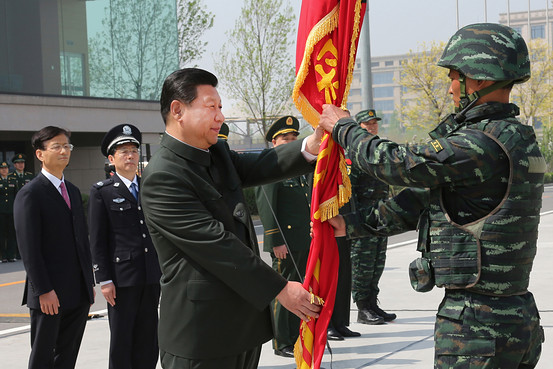Home -> News -> Media -> Shades of George W. Bush in Xi Jinping’s Anti-Terror Campaign
Shades of George W. Bush in Xi Jinping’s Anti-Terror Campaign

Xi Jinping is taking a page out of George W. Bush’s playbook.
China’s president has signaled aggressively in recent weeks that a central element of his leadership will be fighting those the government views as terrorists.
The government must “make terrorists like rats scurrying across a street, with everybody shouting “beat them!” the official Xinhua news agency quoted Mr. Xi as saying ahead of a recent trip to the at-times turbulent city of Kashgar.
The city is located in the far western region of Xinjiang, which borders Pakistan and other Central Asian nations. The province has seen widespread interethnic violence in recent years between ethnic Uighurs who call Xinjiang home and Han Chinese who largely control the government and police and who make up a vast majority of China’s citizens.
“The more you sweat in peace time, the less you bleed in war,” Mr. Xi said during his visit, according to a description of the trip posted to the Weibo account of the official Xinhua news agency.
During his trip, he urged military leaders and special police forces to—in essence—be ready for battle, should it come.
A recent uptick in violence emanating from the region is troubling for China’s leadership, particularly as it appears to be spreading beyond Xinjiang’s border. In March, assailants armed with knives attacked a train station in the southern city of Kunming, leaving more than 30 dead. The government later described the attackers as separatists from Xinjiang.
Since then, Mr. Xi has worked hard to stress China’s anti-terrorism efforts. In the past two months alone, Mr. Xi has mentioned anti-terrorism in public remarks 15 times, according to the website of the Communist Party’s People’s Daily newspaper. Earlier this month, Mr. Xi paid a visit to an anti-terrorism training institute, sparking wide coverage in official media.
The Chinese government says growing violence in the region stems from separatists who want to divide Xinjiang from the rest of China and religious extremists, including those with ties to overseas terror groups. But Uighurs in Xinjiang and overseas activists groups say the issue is more complicated and stems partly from what many view as economic discrimination against ethnic Uighurs.
Part of the challenge is linguistic: Many Uighurs today speak minimal Chinese, preferring instead to communicate in Uighur, a Turkic language. During his trip to Xinjiang, Mr. Xi urged improve the teaching of Mandarin Chinese to non-Han students as a way to help ethnic Uighurs and others more easily find jobs, and more importantly, he said, “to promote cooperation among ethnic groups.”
- .U.S. Treasury looks to hold more cash to deal with future crises
- .Yum, McDonald's in Shanghai food safety investigation
- .Yellen defends loose Fed policy, says job market still too weak
- .Carl Icahn says 'time to be cautious' on U.S. stocks
- .Samsung Electronics says second quarter profit likely down 24.5 percent; worst in two years
- .U.S. jobs data seen reinforcing strong growth outlook
- .Asia stocks up on buoyant Wall Street, oil near highs

